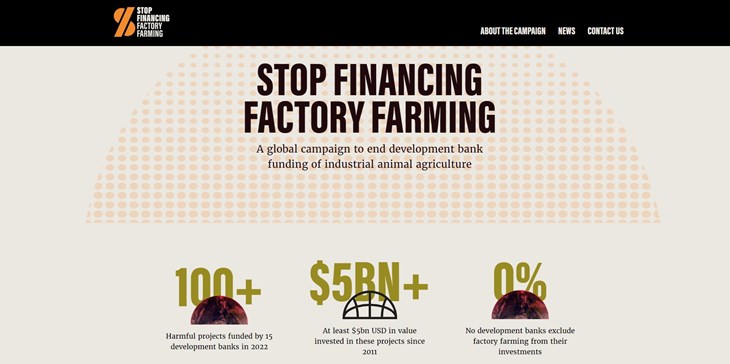2/16/2024
by Ben Williamson
Factory farming could not exist without huge investments made by the financial sector. As we stand today, because of these investment decisions factory farming continues to grow, imperiling our future and spreading destructive forms of animal production to more parts of the world.
Compassion in World Farming believes that these bad investments must end
Large agribusiness corporations involved in factory farming often secure financing through loans and bonds issued by financial institutions. These loans provide the capital necessary for these corporations to further expand their operations, build new facilities, and acquire additional animals. Investors typically aim to profit from the interest generated by these loans, without much consideration of the impact of their investment decisions on human health, the environment, and the lives of animals suffering on factory farms.
Multilateral Development Banks (MDBs) (such as the Washington DC-based World Bank Group, the European Bank for Reconstruction and Development, and the Inter-American Development Bank) make up a significant part of the funding of large agricultural infrastructure projects. While such large financial institutions are typically aware of the enormous impact their giant resources can have on the planet, and often take international agreements, such as the United Nations Sustainable Development Goals and the Paris Climate Agreement into account, they can often be so far removed from how the expansion or construction of new factory farms affect animals and local communities on the ground, that some of their lending projects run the risk of breaking the banks’ own policies.
This is where the effort to Stop Financing Factory Farming comes in
Compassion in World Farming is a member of the Stop Financing Factory Farming (S3F) coalition, which is leading the resistance to MDB support of industrial livestock production. The coalition educates bank leaders and the public on why shifting investments towards agroecological farming systems that put communities first and help protect the planet, are a safer and more sustainable long-term investment.

The coalition was founded in 2020 by the Bank Information Center and Friends of the Earth. In 2021, Compassion in World Farming joined the coalition in opposing a new loan from the Inter-American Development Bank (IDB) to Marfrig—the second largest Brazilian food processing company, after JBS—on the basis that the expansion of its cattle supply chains would likely continue to deforest and degrade some of the most vulnerable and important ecosystems left on our planet–the Amazon and Cerrado regions–for many years to come. The pressure led to the bank dropping the $200 million loan on environmental grounds.
Multilateral Development Banks have invested over $4.6 billion in industrial livestock since 2010
Despite this early success, MDBs continue to fund harmful projects in Africa, Latin America, and Asia, to the tune of hundreds of millions of dollars. Through its vital work S3F continues to share its expertise and on-the-ground experience to help end unsustainable finance and promote healthier alternatives.
Factory farming harms animals, humans and the planet. It drives greenhouse gas emissions, pollution, zoonotic diseases and antimicrobial resistance, and causes declines in biodiversity. In addition to appalling animal welfare conditions on factory farms, the sector is one of the leading causes of deforestation, land grabs, and global injustices through the production of poor quality food.
Find out more about our joint efforts to #StopFactoryFarming, visit Stop Financing Factory Farming.

